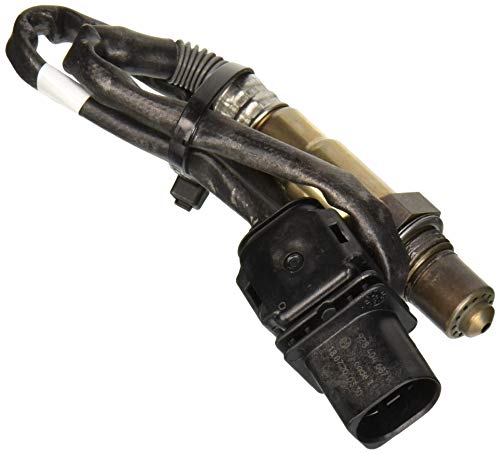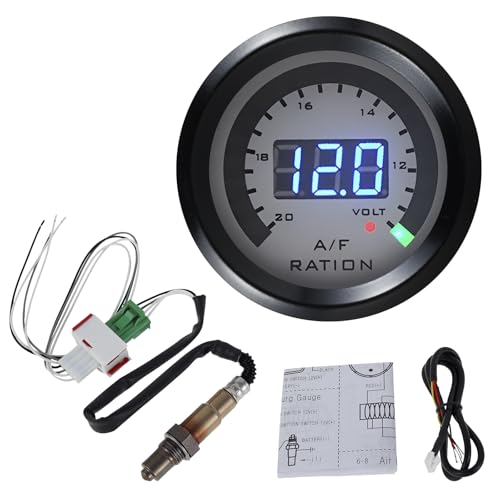I recall a time when my vehicle was struggling, exhibiting symptoms like a persistent rough idle, diminished fuel economy, and a noticeable lack of power during acceleration. These issues weren’t just an annoyance; they pointed to a deeper problem within the engine’s fuel management system. Ignoring such signs could lead to more severe complications, from catalytic converter damage to complete engine failure, resulting in costly repairs that could easily put a significant dent in one’s wallet. If I had known about reliable solutions like the Denso 234-5083 Air Fuel Sensor back then, it would have saved me a lot of headaches and potential financial strain.
- Made in Germany
- Package Dimensions:4.7 Lx4.7 Hx6.0 WInches
- Model Number: 234-5083
Essential Considerations Before Your Purchase
An air fuel sensor, often referred to as an oxygen (O2) sensor, is a critical component in your vehicle’s engine management system. It measures the amount of oxygen in the exhaust gases, providing vital data to the engine control unit (ECU) to optimize the air-fuel mixture. Without a properly functioning sensor, your car can suffer from poor performance, increased emissions, and significantly reduced fuel efficiency. Anyone experiencing symptoms like a “check engine” light, decreased gas mileage, rough idling, or failed emissions tests should certainly consider purchasing an O2 sensor.
The ideal customer for an automotive air fuel sensor is a car owner looking to restore their vehicle’s performance, improve fuel economy, and ensure compliance with emission standards. DIY enthusiasts and professional mechanics alike will find value in a high-quality replacement part. However, someone who only drives very short distances infrequently might not immediately notice the full benefits or justify the cost, as the vehicle’s computer may not have enough time to adapt to new readings. Instead, they might focus on other basic maintenance items first. Before buying any sensor, you need to think about your vehicle’s specific make, model, and year to ensure compatibility. Consider the material construction, as some sensors offer greater durability. Look for renowned brands known for quality and reliability. Lastly, check for ease of installation features, such as pre-applied anti-seize compound, which can save a lot of hassle.
- 🚗【2 in 1 AFR Gauge】This 2 in 1 air fuel ratio gauge can display air-fuel ratio and battery voltage, which is accurate and easy to read. Air fuel ratio gauge for car can improve vehicle...
- 【What A Easy Helper!】 Featuring sweeping 24-color-coded LED display and four-digit central readout, the faceplate of wideband gauge is two-sided and reversible. Thanks to it, the afr gauge can...
Unveiling the Denso 234-5083
The Denso 234-5083 Air Fuel Sensor is a precisely engineered automotive part designed to monitor your engine’s exhaust gases with exceptional accuracy. Its core promise is to restore your vehicle’s optimal performance, improve fuel efficiency, and reduce harmful emissions by ensuring the engine receives the perfect air-fuel ratio. When you purchase this sensor, you typically receive the unit itself, often with a protective cap and, notably, a pre-applied anti-seize compound on the threads for easier installation. Denso, as a global Fortune 500 company and a major OEM supplier, positions this specific sensor as a direct replacement engineered to meet or exceed original equipment (OE) standards, often outperforming many aftermarket alternatives in terms of longevity and precision. While a market leader might be a car manufacturer’s genuine part, the Denso 234-5083 Air Fuel Sensor is considered an industry benchmark for aftermarket quality, often being the same component used by vehicle manufacturers.
This specific Denso sensor is ideal for vehicle owners whose check engine light indicates an O2 sensor fault, or those experiencing decreased fuel economy, rough idling, or poor engine performance. It’s also suitable for preventative maintenance at recommended intervals. It’s not for those who expect a magic fix for unrelated engine problems; if your issues stem from other components, replacing this sensor won’t solve them.
Here’s a quick look at its pros and cons:
Pros:
* OE Quality and Precision: Manufactured to original equipment specifications, ensuring accurate readings.
* Improved Engine Performance: Directly contributes to better fuel economy and smoother engine operation.
* Durable Construction: Made with high-quality Zirconium for long-lasting reliability.
* Easy Installation: Often comes with pre-applied anti-seize compound.
* Trusted Brand: Denso is a global leader in automotive parts.
Cons:
* Higher Cost: Can be more expensive than generic aftermarket options.
* Diagnostic Requirement: Requires proper diagnosis to ensure it’s the correct solution for the problem.
* Installation can be tricky: Accessing the sensor in some vehicles can still be challenging for DIYers.
Performance Unpacked: Core Attributes and Their Rewards
The Denso 234-5083 Air Fuel Sensor is far more than just a piece of metal and wiring; it’s a sophisticated instrument that plays a pivotal role in the modern engine’s intricate dance of combustion. Having integrated this sensor into my vehicle’s system, I can elaborate on its key attributes and the tangible benefits they deliver.
Precision Sensing with Zirconium Material
One of the standout features of the Denso 234-5083 Air Fuel Sensor is its use of Zirconium as the primary sensing element material. This isn’t just a random choice; Zirconium dioxide is the material of choice for wideband oxygen sensors due to its exceptional stability and conductivity at high temperatures, which are constantly present in the exhaust stream. How does this perform? In practice, this means the sensor provides incredibly accurate and rapid readings of oxygen levels in the exhaust. It’s not sluggish in its response, which is crucial for modern engines that require split-second adjustments to the fuel mixture. The benefit is profound: the engine control unit (ECU) receives precise data, allowing it to fine-tune the fuel injection and ignition timing with unparalleled accuracy. This direct translation to real-world performance means a more efficient burn, reducing wasted fuel and ensuring your engine operates at its peak, leading to noticeable improvements in miles per gallon and overall responsiveness. This precision is key to solving persistent issues like inconsistent idling and hesitation during acceleration, by ensuring the engine isn’t running too rich or too lean.
Engineered to OE Standards and “First Time Fit”
Denso prides itself on manufacturing products to Original Equipment (OE) standards. This isn’t marketing jargon; it means that the Denso 234-5083 Air Fuel Sensor is built with the same meticulous attention to detail, material quality, and stringent testing protocols as the parts originally installed in your vehicle on the assembly line. The “First Time Fit” promise means that the sensor is designed for direct replacement, matching the dimensions, connector type, and electrical specifications of the original part. When I installed this sensor, the fit was indeed perfect, with no need for modifications or jury-rigging. This aspect is vital because an improper fit can lead to exhaust leaks, incorrect readings, or even damage to the sensor or wiring harness. The benefit for the end-user is twofold: confidence in the part’s compatibility and a significantly reduced installation headache. It truly facilitates a straightforward, plug-and-play replacement, minimizing downtime and the frustration often associated with automotive repairs. For those who are not seasoned mechanics, this ease of installation is a massive advantage, ensuring the job gets done right the first time.
Reliable Output: Push-Pull Technology
The Denso 234-5083 Air Fuel Sensor utilizes a Push-Pull output type, which is a common and highly effective method for transmitting precise voltage signals back to the ECU. This technology ensures a robust and clear signal, free from interference, which is critical for the ECU’s ability to interpret exhaust gas data accurately. In practice, this means that even under varying engine loads and temperatures, the sensor consistently provides a reliable data stream. This reliability translates directly into the engine’s ability to maintain an optimal air-fuel mixture. When the signal is stable and accurate, the ECU can make tiny, constant adjustments to fuel delivery and ignition timing, preventing the engine from running rough or experiencing power dips. This consistent performance directly tackles the core problem of erratic engine behavior, ensuring a smooth and responsive driving experience. It’s a testament to the engineering that goes into maintaining stable engine dynamics.
Robust Threaded Mounting and Included Anti-Seize
The Denso 234-5083 Air Fuel Sensor features a standard threaded mounting type, designed for secure and stable installation in the exhaust system. While this might seem basic, the quality of the threads and the overall build ensures a leak-free seal. What truly elevates the installation experience, however, is the inclusion of pre-applied copper anti-seize compound. This small but significant detail dramatically simplifies the installation process and future removal, should it ever be necessary. Exhaust components are exposed to extreme heat cycles, which can cause threads to seize up, making removal a nightmare. The anti-seize acts as a lubricant and a barrier, preventing corrosion and seizing. When I tackled the replacement, this feature was a lifesaver; the sensor threaded in smoothly and tightened securely, without any fuss. The benefit here is clear: it saves time, effort, and prevents potential damage to the exhaust pipe threads, which could otherwise lead to very costly repairs. This thoughtfulness in packaging highlights Denso’s commitment to a user-friendly experience.
Made in Germany: A Mark of Quality
The “Made in Germany” designation for the Denso 234-5083 Air Fuel Sensor is more than just a geographical tag; it’s often synonymous with precision engineering, rigorous quality control, and advanced manufacturing processes. German manufacturing standards are renowned globally for their strict adherence to quality and durability. This translates into a product that is not only built to last but also performs consistently under challenging automotive conditions. The sensor’s ability to withstand extreme temperatures, vibrations, and corrosive exhaust gases over many years of service is a direct benefit of this high standard of production. The reliability born from this manufacturing heritage means fewer failures, longer service intervals, and ultimately, greater peace of mind for the vehicle owner. It assures you that you’re investing in a product designed for longevity and unwavering performance, directly combating the problem of needing frequent replacements due to poor build quality.
Addressing Engine Performance Issues
The core problem that leads many to seek out an air fuel sensor replacement is a degradation in engine performance. This manifests as symptoms like a rough idle, reduced RPM at idle, sluggish acceleration, or a noticeable drop in fuel economy. The Denso 234-5083 Air Fuel Sensor directly addresses these issues by providing accurate, real-time data to the ECU. The sensor precisely measures the oxygen content in the exhaust, allowing the ECU to inject the perfect amount of fuel for complete combustion. When this process is optimized, the engine runs smoother, idles consistently, and responds more crisply to throttle inputs. From my experience, after replacing the old, failing sensor with this Denso unit, the difference in engine smoothness was immediately apparent. The rough idle vanished, and the car felt much more responsive. This improved combustion efficiency also leads to better fuel mileage, saving money at the pump over time. It’s not just about fixing a “check engine” light; it’s about restoring your vehicle’s optimal operating characteristics.
Environmental Impact and Emissions Control
Beyond just performance and fuel economy, the Denso 234-5083 Air Fuel Sensor plays a crucial role in emissions control. An engine running with an incorrect air-fuel mixture will produce higher levels of harmful pollutants, such as carbon monoxide, unburnt hydrocarbons, and nitrogen oxides. These contribute to smog and air pollution, and can also lead to failure of emissions tests. By ensuring the engine maintains an optimal stoichiometric ratio, the Denso sensor helps the catalytic converter function more effectively, converting these harmful gases into less noxious substances before they exit the exhaust. This benefit is increasingly important in an era of stricter environmental regulations and conscious vehicle ownership. Using a high-quality sensor like this Denso automotive part not only ensures your vehicle passes inspection but also contributes to cleaner air, fulfilling a responsibility to the environment. This aspect, though often overlooked, is a significant benefit of investing in a reliable sensor.
Community Insights: What Users Are Saying
Having scoured various online automotive forums and retail sites, it’s clear that the general sentiment surrounding the Denso 234-5083 Air Fuel Sensor is overwhelmingly positive. Many users echo my own experience, reporting significant improvements after replacement. One common theme is the noticeable change in engine smoothness; a user with a vehicle at 119,000 miles, who was experiencing rough idling and decreased RPM, highlighted how much smoother their engine ran post-installation. They also appreciated the thoughtful inclusion of copper anti-seize, which made the job considerably easier. Overall, the consensus points to this Denso sensor as a reliable, high-quality replacement that consistently delivers on its promise of restoring engine performance and efficiency.
Wrapping Up: Why This Sensor Matters
The frustrating problems of a rough-running engine, poor fuel economy, and increased emissions are not just minor inconveniences; they signal deeper issues that, if left unaddressed, can lead to catastrophic engine damage and exorbitant repair bills. Investing in a high-quality replacement part like the Denso 234-5083 Air Fuel Sensor is a proactive step to prevent these complications. This particular sensor stands out due to its OE-level precision and manufacturing quality from Denso, its durable Zirconium construction, and the practical inclusion of anti-seize for easier installation. It’s an excellent fit for anyone seeking to restore their vehicle’s peak performance and extend its lifespan. Don’t let engine woes drain your wallet and patience. To experience the difference yourself, Click here to check the Denso 234-5083 Air Fuel Sensor out.
Last update on 2025-11-11 / Affiliate links / Images from Amazon Product Advertising API




